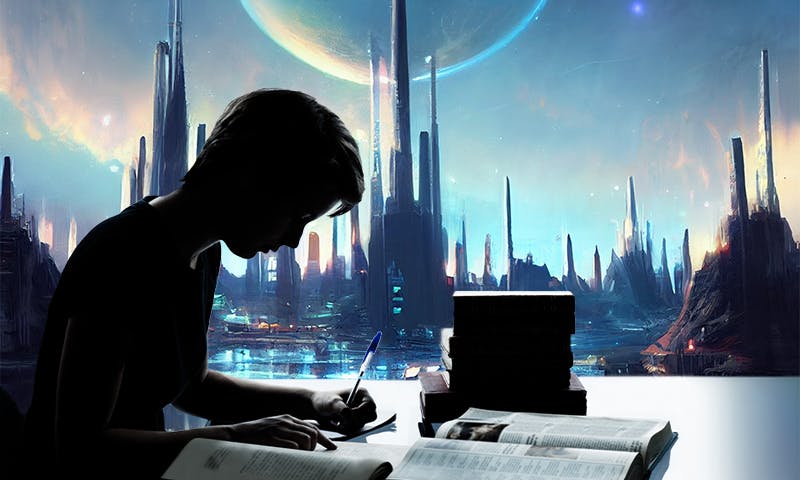BBehind most tech billionaires is a science fiction book they read as a teenager. Bill Gates was influenced by Stranger in a Strange Land, a 1960s story about culture clashes when a Martian visits Earth. Google’s Sergey Brin was inspired by Neal Stephenson’s Snow Crash, the cyberpunk classic about hackers and computer viruses in an Orwellian Los Angeles. Jeff Bezos admires Iain M. Banks’ Culture series, which unfolds in a utopian society of humanoids and artificial intelligences, often orchestrated by powerful AI known as “Minds.” Elon Musk even named three of SpaceX’s landing drones after starships from Banks’ books to honor their role in shaping his vision for space exploration.
It makes sense that science fiction widens the horizons of our dreams, introduces us to new technologies and political systems, and helps us envision the future. Many people credit science fiction for expanding their imaginations. However, these tech titans may overlook the allegories in their favorite sci-fi books. Musk has stated that he identifies as a utopian anarchist, a concept present in Iain Banks’ work. Yet in Banks’ post-scarcity utopia, billionaires and their immense influence are ostracized to the most backwards parts of the galaxy. I recently interviewed six leading science fiction authors and asked them about the impact of science fiction on society and the future.
N.K. Jemisin is known for her influential works such as
The Fifth Season
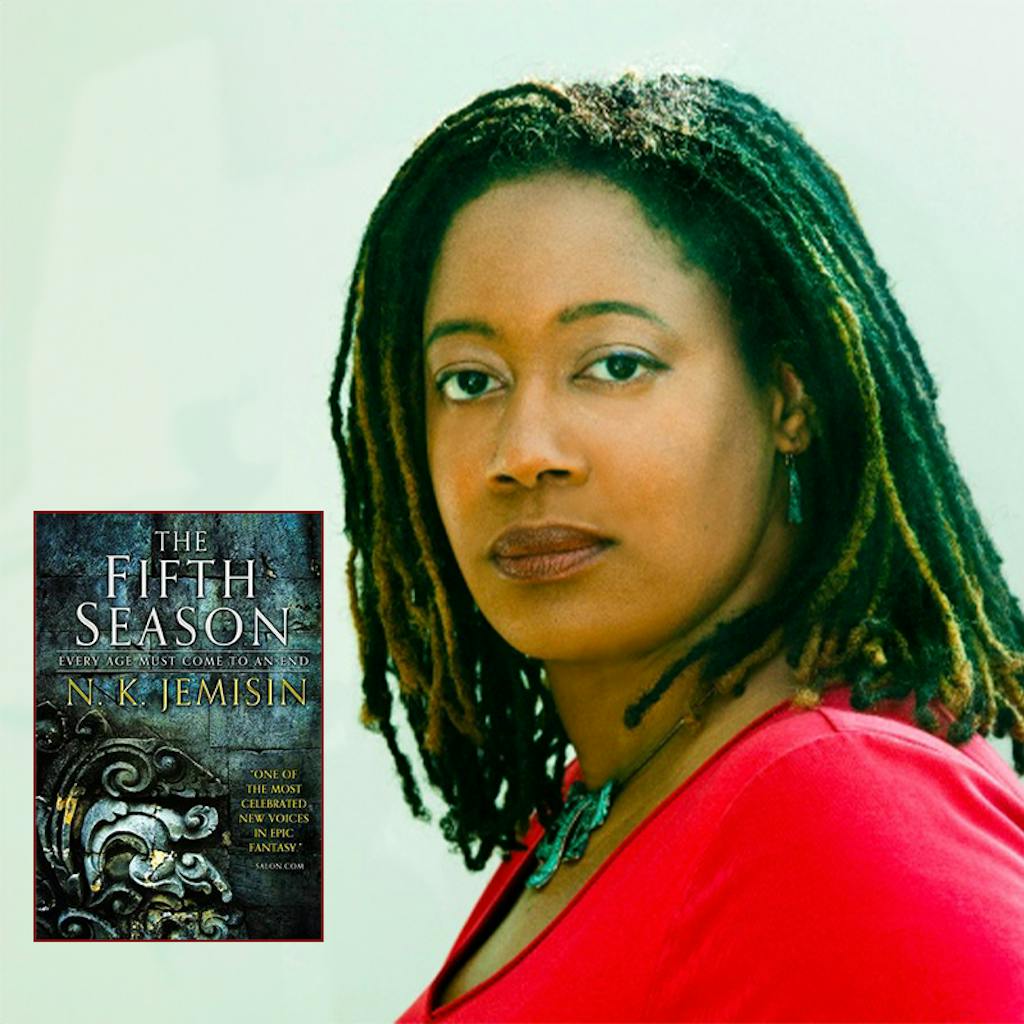
The City We Became . Her stories delve into themes of power, oppression, and resilience within intricately constructed worlds, earning her global recognition as a master of speculative fiction. Andy Weir and is best known for his debut novel, which was adapted into a hit movie in 2015. Weir’s works are firmly rooted in hard science fiction and combine scientific accuracy with captivating storytelling as he explores the resourcefulness of individuals facing challenges in space.
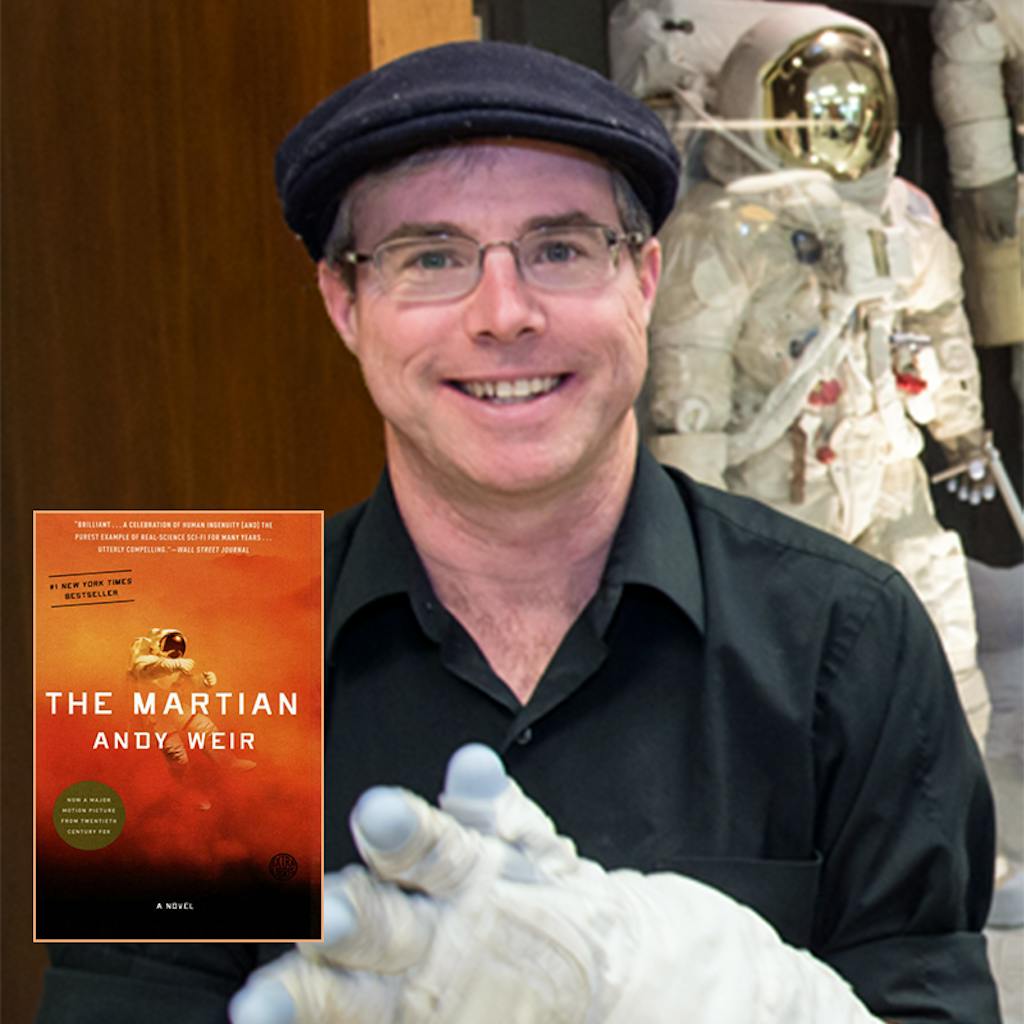
Andy Weir Lois McMaster Bujold is celebrated for her The MartianVorkosigan Saga
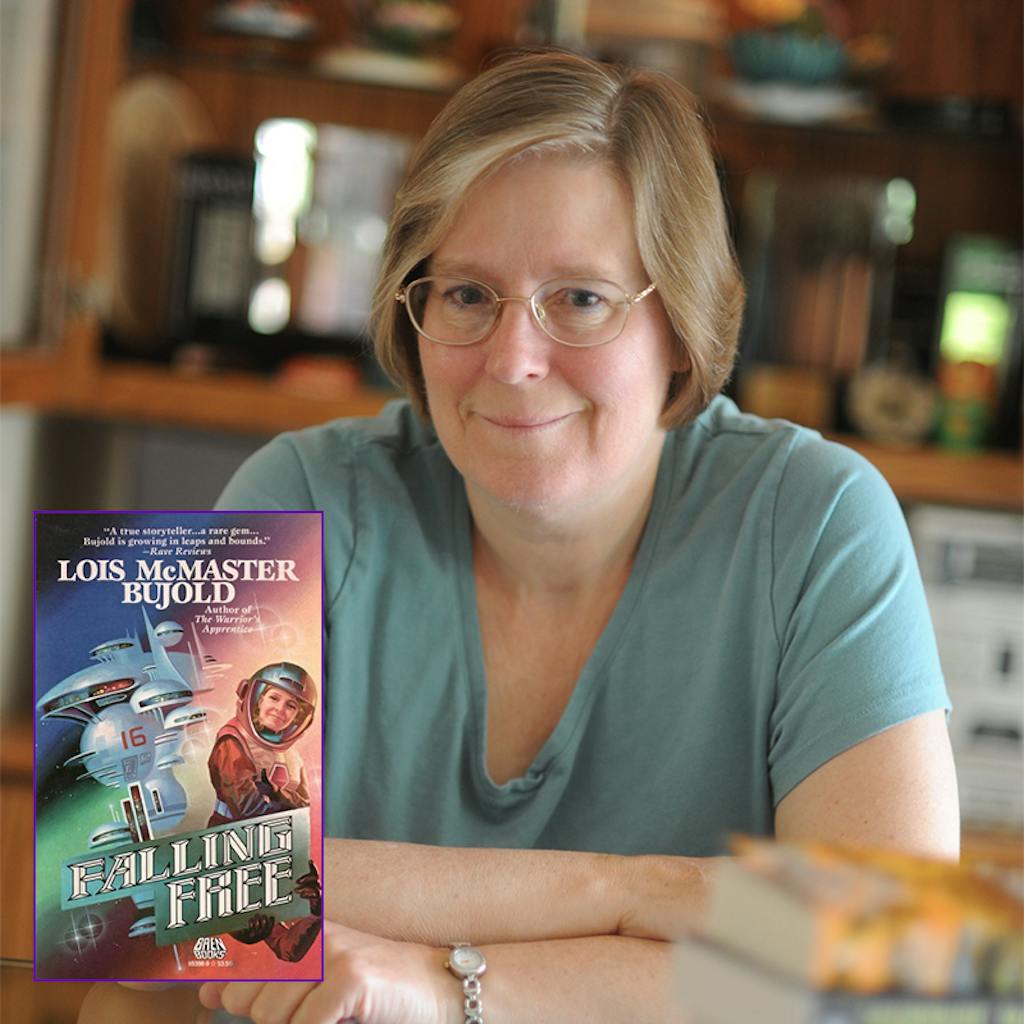
and her multiple Hugo and Nebula awards. She excels in character-driven storytelling, blending elements of science fiction and fantasy to explore themes of identity and leadership within richly imagined worlds. Kim Stanley Robinson is renowned for his series, which delves into themes of societal evolution, transparency, and the complexities of human nature, providing insightful examinations of civilizations grappling with technological advancement and ethical dilemmas. Cory Doctorow’s
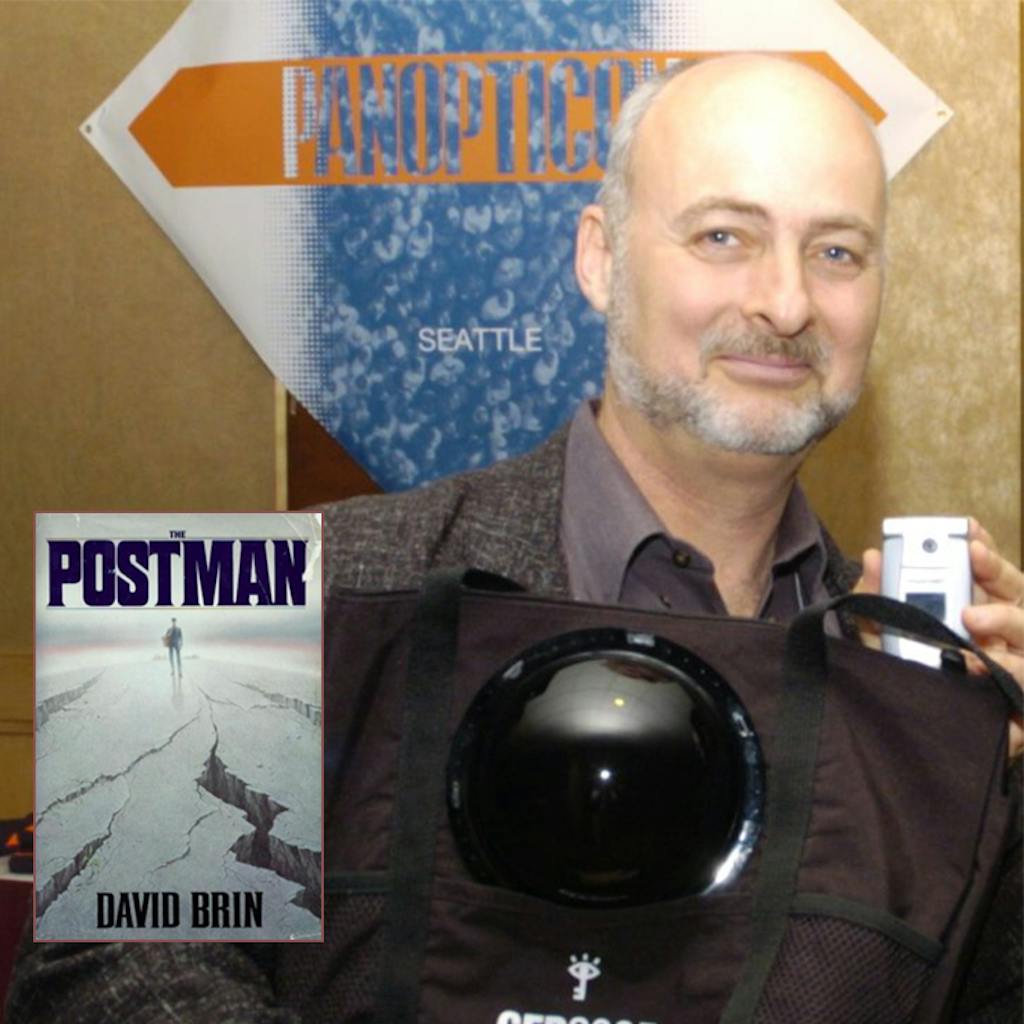
David Brin most recent novels include The Postman and the Uplift The Lost Cause

, a solarpunk science-fiction novel addressing hope in the face of the climate emergency. Both his novels and nonfiction explore privacy and digital rights, offering thought-provoking perspectives on the intersection of technology and society. Charles Stross The Bezzle and ’ notable novels includeMerchant Princes

series. Stross delves into the implications of technological singularity, alternate realities, and post-humanism, creating stories that skillfully blend speculative futurism with political intrigue and social commentary.Does science fiction end up becoming a blueprint for the future we should create? Accelerando and the N.K. Jemisin: It shouldn’t. Science fiction prides itself on being visionary, but like any literary genre, it ends up examining whatever issues the author is dealing with in the present. We just do it more allegorically. If you look back at science fiction from 50 years ago, very few writers predict anything close to our present. Many of those old books correctly predicted certain technologies, but that's all—they didn’t predict how we’d use them, how they’d fail, and how they’d affect us. Some of those authors could barely grasp the idea of women—half of humanity!—as complex beings with their own agendas. Is it a “visionary” prediction of the future when one small thing is predicted correctly but everything else is wrong? Perhaps if technology is the only thing you care about. Until fairly recently, science fiction hasn’t been very concerned with the bigger picture.
Cory Doctorow
: There’s no denying that many people who actually create things are influenced by science fiction. There are numerous concrete examples of this. The well-known example is the flip phones that were designed by people inspired by Gene Roddenberry’s props on . Certainly when we think about space travel, all the things that people want to do come from science fiction. So it’s definitely true that this shapes people’s vision of it. But don’t mistake the analogy for reality. It's like people who say we all need to go find Plato’s cave. “Why don’t we track down that darn cave?” And so to treat the allegory as reality is to miss the fact that it’s an allegory.
Charles Stross: Once you eliminate anything that relies on what I call “magic wand technology”—things that ignore the laws of physics—you end up with a very limited subset of science fiction that can serve such a purpose. The problem is, it’s more often meant as a grim cautionary warning than as a desirable destination. The futures depicted in dystopian cyberpunk works such as Star Trekor just plain horrible dystopias like
Some authors could barely comprehend the idea of women as complex beings with their own agendas.
The Handmaid’s Taleare certainly possible but absolutely should not be built! Snow Crash Lois McMaster Bujold : Science fiction does act as cultural brainstorming, expanding the range of what’s possible. But the fiction part focuses on maximizing drama, not sensible, careful problem solving. These are two different skill sets, not often found in the same individuals. So, brainstorming, yes; product development, no. You need Legal, HR, researchers, the shareholders, and the public in on the latter. As they will be financing it all and suffering the consequences of any mistakes. Beyond inspiring specific technologies, does science fiction ever stimulate actual future trends?
I’ve spoken to many who claim that science fiction helped—and helps—them to foresee the future. Science fiction ideas have inspired positive tech trends from computers to cell phones and many advances in medicine. But it is the mistakes we manage to avoid, sometimes just in time, that qualify some sci-fi tales as world-changers. Retired military officers attest that works likeDoctor Strangelove
On the Beach
David Brin: caused changes and assisted in avoiding accidental war. Citizens are unaware of how many disasters these protectors have prevented. While it is more challenging to portray optimism than doomsday scenarios, science fiction has also inspired millions to consider how we can improve gradually, or else raise future generations worthy of the stars. I don’t think that fiction should be used as a tool to influence the real world. I write only for entertainment and no other reason. I find morals and agendas in stories to be bothersome and they detract from my immersion., Fail-Safe, Cory Doctorow, and War Games The present is the standing wave, where the past is shaping the future. So, if you can change the way people think about the present, you can change the future. One way to do that is through futuristic allegory. One of the things that science fiction can do that is very helpful in terms of how it influences how people think about technology—and this is the thing that cyberpunk did that was so great—is it questions not what the gadget does, but who it does it for and who it does it to. It becomes a question of the social arrangements of the technology more than the underlying technology itself. One of the great lies of capitalism is Margaret Thatcher’s saying that there is no alternative. That things have to go a certain way. And at its best, science fiction has people go, “Well, what if we had this gadget that is around us—or that people are predicting will come soon—but it wasn’t controlled by the people who insist that it’s their destiny to control it?”
Andy Weirand who it does it
. It becomes a question of the social arrangements of the technology more than the underlying technology itself. One of the great lies of capitalism is Margaret Thatcher’s aphorism that there is no alternative. That things have to go a certain way. And at its best, science fiction has people go, “Well, what if we had this gadget that is around us—or that people are predicting will come soon—but it wasn’t controlled by the people who insist that it’s their destiny to control it?”N.K. Jemisin: for Understanding how society—people—function is crucial in predicting how the future will unfold. That’s how you get Ursula Le Guin exploring nonbinary gender in the 1970s, and Octavia Butler predicting America’s current slide into Christian nationalist fascism 30 years ago. That’s why the best episodes were written by people who recognized that you can’t reach that shiny happy hi-tech future until we make a change first and prioritize things like ensuring everyone eats and receives a decent education. I think this is why some of the best predictive science fiction has been written by writers from marginalized groups, and by anyone else who’s had lived experience of society’s uglier paradoxes. tobest episodes were written by people who understood that you can’t get to that shiny happy hi-tech future until
While optimism is harder to dramatize than apocalypse, sci-fi has encouraged millions to lift their gaze.
change first and prioritize things like making sure everyone eats and gets a decent education. I think this is why some of the best predictive science fiction has been written by writers from marginalized groups, and by anyone else who’s had lived experience of society’s uglier paradoxes. Are there times when science fiction is taken too literally? Star Trek’s Lois McMaster Bujold we I want to say “all the damn time,” but that is probably an exaggeration. The thing is that the same is true of all fiction. Writers can only control their words-in-a-row; they can’t control how people read them. Each person brings their own experiences, obsessions, traumas, tics, triggers, and limitations to their unique internal construction of what they read, and what comes out the other end of this mental mixer can sometimes have very little relation to what the writer thought they were putting in.
Charles Stross:
Yes, the entire current AI bubble is exactly that. The whole idea of AI has been turned into the centerpiece of a secular apocalyptic religion in which we can create superhumanly intelligent slaves that will solve all our knottily human intellectual problems, then work out how to liberate our pure soul-stuff from these clumsy rotting meatbags and upload us into a virtual heaven. And right now, some of the biggest tech companies out there are run by zealots who believe this stuff, even though we have no clear understanding of the mechanisms underlying consciousness. It’s an unsupported mass of speculation, but it’s threatening to derail efforts to reduce our carbon footprint and mitigate the climate crisis by encouraging vast energy expenditure.Cory Doctorow
: VR and cyberspace are important topics. They represent ideas that are used to make plans for new products. Another big topic is AI. These ideas are used to make us think about what we mean by 'consciousness' and 'intelligence,' and to consider non-human things morally, which can change how we see our world. : I think science fiction has been taken over by a negative view of technology. Shows like
Black Mirrorall have the same message: 'Technology is bad because people are bad.' But I don't think that's true. It's hard to think of a technology that has caused more harm than good. People are better than they are often thought to be.
Andy WeirN.K. Jemisin : What readers think about a story is not just about the words on the page. What the author writes is only one part of the story; the other part is what the reader brings to it—their existing fears, prejudices, and understanding of the world. However, it's interesting that many of the works mentioned by billionaires and technocrats as inspiring are cautionary tales about what could happen if billionaires and technocrats become too powerful. As the world becomes less religious, could science fiction help people find meaning by imagining these stories as possible futures?
Lois McMaster Bujold: I have said that the sense of wonder in science fiction is like the feeling of awe that people seek in fantasy literature but in a secular way. But really, I think people would be better off finding that wonder in real science and the stories it tells about real life. No ideology or religion has not been used to make humans treat each other badly. I don’t think just getting rid of belief in the supernatural will change that, because the real problem is with humans—ultimately, our biology, so maybe we should focus on real science and leave the fiction aside.
Charles Stross
: It already has. There’s Russian Cosmism, which started as a Russian Orthodox Christian theologian’s weird speculation in the late 19th century before it spread and influenced the global rocketry community. “Space colonization! It’s our job to be fruitful, multiply, colonize space, and fill the entire cosmos. And then Silicon Valley!” It follows the same structures as apocalyptic Christianity, except it discarded the inconvenient God/Jesus duo in favor of a belief in its own rationality.: I think something else has already taken its place. Especially environmentalism. I think the human desire to believe in something greater than ourselves is natural, and we can't really go without something to look up to for long. So we are going back to where all religions start: worshipping nature. I'm not trying to put down environmentalism, nor am I saying we should ignore the environmental problems we have caused with emissions. I'm just saying that the psychology at play is very similar to religion, and I think it's fulfilling that need people have to be good. It's not a bad thing for people to want to reduce emissions in order to be moral. Just like it wasn't bad for people to have a religious opposition to murder.
These people are saying “we finally created the utopia of Neuromancer.” And I go, “I don’t think you read Neuromancer.”
Science fiction has already played a big part in the most significant event in religion. And it's not really about God. Most ancient cultures had stories about a perfect past, when everything was better. But our culture is the first to imagine that perfect world as a future that our descendants could create. I'm not worried that some of those descendants might be mostly made of metal and silicon, exploring space for us. What matters to me is teaching them, and our regular children, to be good people.What comes to mind when you hear Musk, Bezos, or Mark Zuckerberg talk about being influenced by science fiction?
Andy WeirCory Doctorow
David BrinSometimes I hear these guys talk and I think, 'I don't know what science fiction you read because it doesn't sound like any science fiction I read or write.' It's strange because I believe Bezos left the first positive review on Amazon for my first novel. This reminds me of a scene in
A Fish Called Wanda
where Kevin Kline's character keeps misquoting philosophy to his girlfriend, Jamie Lee Curtis, and eventually she turns to him and says, 'The central message of Buddhism is not ‘every man for himself.’' These people are saying 'we finally created the utopia of.' And I look at them and I go, 'I don't think you read .' Maybe you just played Cyberpunk 2077.' Charles Stross NeuromancerBillionaires don't seem to be critical readers. They don't seem to have noticed the underlying message of the science fiction they read as kids, or noticed where there's a concerning lack of underlying message. One exception is Steve Jobs. He's no longer with us so we can't ask him, but I think his vision for the future of computing was, 'I want to build the black monolith from Neuromancer2001: A Space Odyssey
.' I can imagine young Steve getting stoned or dropping acid and watchingin the cinema and being struck by the vision of a plain black featureless that reaches inside the ape-men’s brains and makes them fundamentally smarter. Every device he produced, from the Macintosh onward, had some aspect of the Monolith to it. The only problem is, Jobs’ implementation of the Monolith seems to principally be used to make us angry and stupid, instead of spreading enlightenment.I think anything that leads to innovation and funding for research is good. If it’s a cult of personality like Musk, or immense wealth on a man-baby like Zuckerberg, it doesn’t matter so long as the research gets done. That knowledge remains with humanity long after the people who funded it are gone. 2001 It depends on which science fiction stories influence them. Those who give to causes—like saving the planet—because they read novels like thing Soylent Green
The whole idea of AI has been turned into the centerpiece of a secular apocalyptic religion.
Andy Weirmay help us avoid bad outcomes. Unfortunately, some now indulge in prepper fantasies of surviving an apocalypse or “Event” as in some low-cost
David BrinN.K. Jemisin Earth or watched I don’t think they’re influenced by any science fiction. I think they claim to be because they think it makes them seem smart. Frankly I suspect some of those guys can’t read. Have you ever imagined that someone might read your work and then create technologies or make decisions that could affect the future of our species? Mad Max flick.
N.K. Jemisin: No. Firstly, I don't overly idealize technology or give it more power than it actually has. Technology is a tool. Tools do not have the power to change basic human nature; the person you are with a hammer is the same person you are without it. Do you want to blame the person who first thought up a hammer for what you do with that hammer? Does that make sense? Language is a tool, too—a more complex and more powerful one, but it does not have the ability to control you. So this whole idea that fiction causes people to act is just so childish and strange to me. Human beings are regularly introduced to new ideas and technology. Throughout our entire lives, from birth to death, we are adapting to new materials, new methods, and new anxieties. How we adapt/react to those anxieties? That's the choice. That's what matters. Anyone who chooses to destroy democracy or harm the environment was going to do that regardless. A book didn't “make them do it.” We wouldn’t accept that excuse from a 3-year-old. They made a choice, then blamed a book in order to avoid taking responsibility for their actions. We should probably stop accepting that excuse from billionaires, too.
Cory Doctorow
: It doesn’t matter what you write. There are people who draw entirely the wrong lesson from it. My first novel is about how dreadful reputation economies are and how they create these winner-take-all economies where you believe you have a meritocracy, but in reality, the people who lucked into a bit of an advantage managed to maintain that advantage over long periods. And so many people have read that book and sent me well-intentioned emails saying “I read your book and I was so inspired. Now I’m going to go and build this technology from your book.”Charles Stross
Sci-fi has been hijacked by dark, dismal technophobia. Tech is bad because humanity is bad. It’s not true.
: For the past ten years, I've been writing critical political satire disguised as Lovecraftian horror stories. I'm reasonably confident that Cthulhu isn't real, so no risk there! I am, however, regretting the lack of emphasis inon how terrible the outcome of singularity is for humanity.
What’s the worst technology or idea from science fiction that you’re afraid Silicon Valley might turn into a reality?Charles Stross: Accelerando Data mining. And it’s been here for decades and is getting worse. As an editor of mine put it, “the biggest threat to humanity in the 21st century is too much information.” It makes the kind of intrusive police state 20th-century dictatorships desired almost trivially easy to implement—and the United States is wide open and vulnerable, in the absence of a constitutional-level right to privacy and courts with teeth willing to enforce it in the face of government opposition.
Lois McMaster Bujold:
I'm pretty sure Silicon Valley is capable of coming up with all sorts of things I neither want nor need all on their own. Cory Doctorow
: In an era where you can add blockchain to the name of your iced tea company, and increase your share price by $10 million, or add AI to the name of any product, it is all just a way to just make an unfalsifiable claim to being on the cutting edge and having a share in these eventually very large returns that the investor community has assured us are absolutely coming for these technologies. Morgan Stanley keeps saying that AI is a $13 trillion market. And so if AI is a $13 trillion market, then your AI-enabled mascara or fertilizer has some claim on that $13 trillion in value. And so do we need to build AI? And do we need these products to be in a position where they’re making decisions at high speed that are incredibly consequential for actual human beings? Absolutely not. There are many stereotypes about AI, such as Skynet or The Blob. If the geniuses in the Silicon Valley create new entities that are extremely intelligent feudal lords or rulers of unpredictable blobs, then we might be in trouble. But if these new beings have limits, individual differences, and some competition, then we might use rewards to persuade some of them to protect us from the worst of them. Isn't that already what we do with highly intelligent, predatory beings called lawyers.
Do you perceive the impact of science fiction on Silicon Valley and its leadership as mostly positive, mostly negative, or completely insignificant?Cory Doctorow
People would do better to look to real science, and the stories it tells, for that wonder in real life.
David Brin: : It’s neither insignificant nor can it be measured in a way that would allow you to easily categorize it as mostly negative or mostly positive. I think that it’s very difficult to separate the significance of science fiction to technology from the relationship of technology to science fiction, right? Many science fiction works were written by people who worked in technology and were really excited about it. Personal computers and modems are absolutely linked with me going to the science-fiction bookstore in downtown Toronto and buying everything on their 25-cent rack and reading it all. These two things are influencing people at the same time. So I think it’s a mistake to think, oh, well, science fiction is the literary inspiration for technology without understanding that technology is the inspiration for science fiction as well.
Charles Stross
: I think that at this point, Silicon Valley’s culture is self-selecting for people who are in harmony with the worldview it represents. It emerged from an industrial revolution initially driven by engineers—and mainly appeals to white STEM-educated males who have been trained to view themselves as the intellectual elite and to believe that all human problems can be solved by the correct application of technology, which is itself the underlying theme of Gernsbackian science fiction from the 1900s. The damage is already done.Can science fiction influence the direction of society?
: Honestly? No. We’re entertainers. When writers forget that’s their main job, their work suffers. No one likes to be preached at. If I can motivate some kids of today to be the scientists of tomorrow, then great. But I don’t think there’s any specific ideas I’ve had that would lead to a scientific breakthrough. I think there’s a very good chance that my profession is going to vanish in my lifetime. If not mine then in my son’s because, like, how long will it be before an AI can just read a million books? Find out what people like about them and what they don’t, and then be able to make a story.: We should be seen as the wise visionaries that we are! Seriously, we’ve been at this warning-business for a long time. The last 100 years of sci-fi is a treasure trove that should be remembered and utilized, whenever anything truly strange appears on the horizon; it’s likely some eccentric person wrote about something like it in the past.
Lois McMaster Bujold
Andy Weir: Brainstorming is science fiction’s proper job. Evaluating the results is a different and weightier task. People don’t, in general, die from reading a bad novel, which is why writing can be one of the most unregulated professions in the world. You can distinguish the professions that can endanger lives by all the tests, certifications, and laws that surround them—engineering, medicine, piloting both air and water, even accounting and law itself. Do not confuse these two categories.
David BrinCory Doctorow:
Have you ever met science fiction writers? I mean, they are really enthusiastic about technology most of the time. I don’t really understand technology well.Lead image by Tasnuva Elahi; with images by yesdoubleyes and OSTILL is Franck Camhi / Shutterstock
Discussions with futuristic science fiction writers about the societal effects of their writing. Have you met science fiction writers? I mean, they are completely daffy about technology half the time. I don’t have any grip on technology.
Lead image by Tasnuva Elahi; with images by yesdoubleyes and OSTILL is Franck Camhi / Shutterstock


